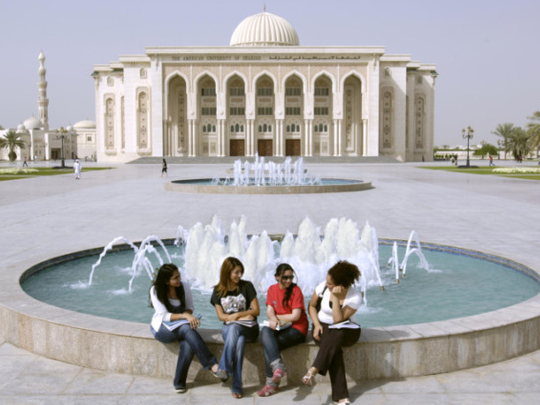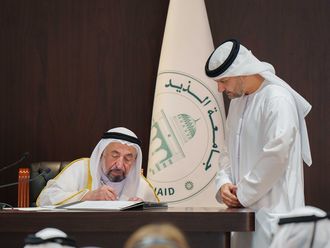
Summer exchange programmes are a vibrant way for universities around the world to swap intellectually stimulating dialogues, cultures, friendships and create memories. If one wants to learn outside the textbook and curriculum, learning from the ‘university of life’ through summer exchange experiences remains a very credible way for the international community of students. Linda Angell, director of exchange programmes, American University of Sharjah, details how students can make the most of them.
Q: What are the core benefits of summer exchange programmes?
A: The American University of Sharjah (AUS) does not really offer a summer exchange programme per se, as we are not strictly exchanging students between two partnered universities (we do that in the normal semesters, but not so much during the summers). During the summers, most of our students study abroad as ‘Visiting Students’, where they direct-enroll in another university for the summer period in order to take 1-2 courses and earn credit that can be transferred back to AUS to count toward their AUS degree. Likewise, incoming students are mostly ‘Visiting Students’ who direct-enroll at AUS as summer study abroad students taking 1-2 courses to earn university credit that they can transfer back to their home university and count toward their degree program.
During our summer programs, students can enroll directly through our on-line application process, or through a third-party provider such as International Student Exchange Program’s (ISEP) direct enroll program (i.e. ISEP-Direct), or through Academic Programs International (API).
Summer exchange programmes at AUS offer a wide range of benefits for incoming study abroad students. Study abroad in general enables learning about new cultures, how to work with people from other cultures, how to adapt and cope in new settings, gaining independence, developing critical thinking skills, being exposed to new ways of doing things, offering different experiences to potential employers, and perhaps even learning a new language, among other things. Additionally, international students may choose to attend AUS in the summer because their major program at their home university may be too constrained to allow study abroad during normal semesters (e.g. this can often be the case for Engineering or Architecture majors).
Emirati students who are studying overseas may decide to take courses at AUS in the summer while they are visiting their families. Other students from regional universities (e.g. Texas A&M Qatar, Qatar University) may enroll in summer AUS courses in order to take courses they need as pre-requisites for other requirements, or to re-take courses that they took earlier, but perhaps did not get the required grade in.
AUS now offers an Intensive Arabic Summer Language Program (SIALP) that enables students to make excellent and focused progress on learning Modern Standard Arabic.
For our outgoing AUS summer study abroad students, there are a number of benefits. These can include all the normal benefits of study abroad as indicated above, plus often in the summer our outgoing students are heading to their home country and it is convenient for them to enroll in a local university to take a few credits while they are catching up with their family and friends at home.
Q; What is the criteria for selecting and accepting?
Criteria for selecting incoming study abroad students to AUS are as follows: Students must have at least a 2.5 GPA, and be in good academic standing, in order to study abroad at American University of Sharjah. In addition, students coming from universities located outside of English-speaking countries must provide evidence of a TOEFL exam score of 530 (71 iBT) or higher, or an IELTS Academic exam score of 6.0 or higher. These English-language exam requirements can only be waived in those cases where students can demonstrate via an official university transcript that they have taken two English writing courses and passed both with a B grade or better.
For the most part, if students are able to meet these criteria, and so long as they submit all of the required application documents (i.e. including an official transcript, university enrollment certificate, passport copy, and application fee) they will be admitted to the university. However, Architecture students must submit a portfolio of their work for review by our Architecture faculty prior to acceptance.
Criteria for selecting outgoing study abroad students from AUS vary by host university. AUS allows any student to study abroad during the summer so long as they have at least a 2.0 cumulative GPA, are in good academic standing, have completed at least one semester at AUS, and attend an English-language of instruction program where they are taking no more than two courses over a six-week period.
Outgoing students must have all of their intended courses approved by their Associate Dean before they depart, and must earn the grade specified by their Associate Dean in order for their credits to transfer back to AUS. The International Exchange Office communicates a range of summer study abroad opportunities to AUS students throughout the academic year, but it is up to the student to pursue these opportunities on their own if interested.
Q: When was the Summer Exchange programme implemented in the AUS?
The International Exchange Office (IXO) at AUS was established in January of 2010.
Approximately 200 AUS students have taken summer courses abroad, and approximately 170 international summer students have studied abroad at AUS since that time. Summer semesters typically last 6 weeks.
How does the dynamism of exchange work to the advantage of the resident student community?
Exchange and other study abroad programs offer significant advantages to the resident student community – everyone benefits. Resident students can benefit from networking connections, cultural insights, and a different way of thinking based on their contacts with international students – all without ever having to leave their home country/institution. Faculty often comment to me about the positive impact international study abroad students have on their classroom discussions and group projects, as they bring an unusual and different perspective to bear on various topics and assignments. In addition, many AUS students report that this is how they first became interested in the possibility of studying abroad, i.e. by getting to know an incoming exchange/study abroad student who told them about their home country and university, and sparked their interest in learning even more and having these kinds of exciting adventures for themselves.
I have several students who have recently returned from study abroad, and now work with the International Exchange Office, who tell me that this is how they learned about study abroad, i.e. through their contact (i.e. as roommates, or classroom teammates) with international students studying abroad at AUS.
One of the common complaints about exchange programmes is that while it is great on the cultural exchange aspect, it weakens the concentration of the student on his/her core subjects as methods of teaching change?
I totally disagree with this, actually. We have observed the exact opposite, to be honest. Students tend to return from their study abroad experience with a renewed intellectual curiosity and excitement about studying in general, and about their majors in particular. We tend to send our very best students abroad, and they come back even stronger, ready to contribute significantly to the university in new and exciting ways.
Exchange programmes are designed to take away deep-seated fears of foreign cultures and human beings. Would you agree?
I do agree that this is the design, and in practice, this is what we have seen. Students often do have a lot of anxiety about their upcoming study abroad experience, and in the International Exchange Office, we spend a lot of time with them to answer their questions, prepare them, and to allay their fears. However, it is the actual experience of arriving in a new country, meeting new people, learning new ways of doing things, seeing first-hand that you can cope well with these changes, and developing new skills and interests you weren’t even aware you had or were interested in – all of these help to connect cultures and strengthen cultural ties.
I think many of us, when we first travel abroad, go through a series of stages where we initially wonder why these people don’t do things like we do back home, and then eventually begin to understand how and why things happen the way they do in the new location and perhaps even gain a sense of the historical evolution of cultural practices. We begin to ‘suspend judgment’ and ‘extend acceptance’, and even celebrate the differences.
Do exchange programmes whet intellectual appetite and sharpen the students’ cognitive and emotional intelligence?
Absolutely! Students are exposed to new topics, expertise and specialty programs. This sparks curiosity – why do people do things this way? How do they do it? Could I do something like that? Students may have the opportunity to serve as research assistants in new and interesting areas, and perhaps even make connections back to something they have worked on in their home university. They can directly observe that a particular locale is not as scary or threatening as perhaps it has been portrayed on the news.
I have particularly noticed this with our Engineering students, who may be very strong with technical issues, but perhaps not always as strong in terms of ‘emotional intelligence’. I have seen a number of them come back to AUS with a whole new attitude and confidence about their ability to deal with a wide range of people and circumstances.
I can think of one particular AUS Engineering student who went off to study abroad at the University of Vermont in a state of absolute terror and worry. He came back to AUS six months later completely transformed - relaxed and confident, and ready to take on graduate school and an international career.
Another Engineering student went to San Diego State University, overcame some significant social challenges while there, and came back to AUS interested in working intensively with international students as part of our IXO tream.
Being a part of these kinds of transformations has been one of the most rewarding aspects of my role as director for International Exchange Programs.













